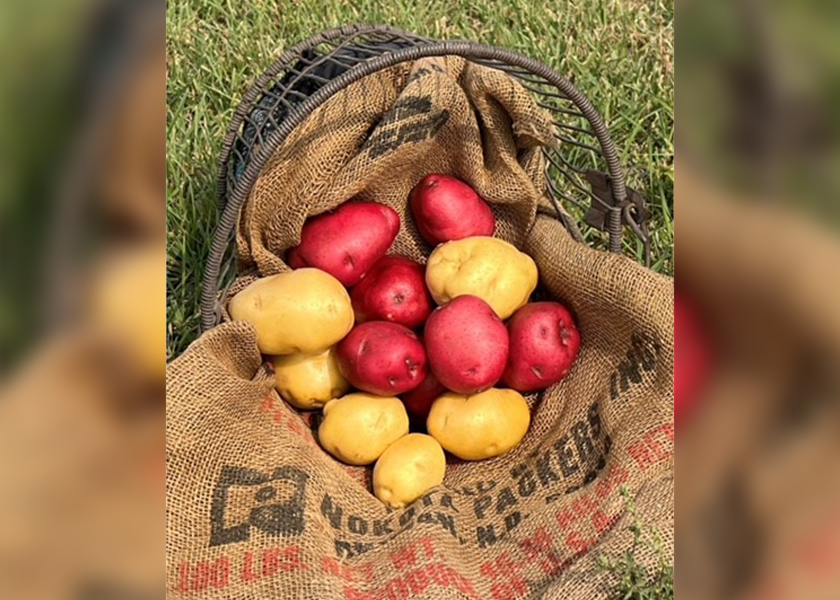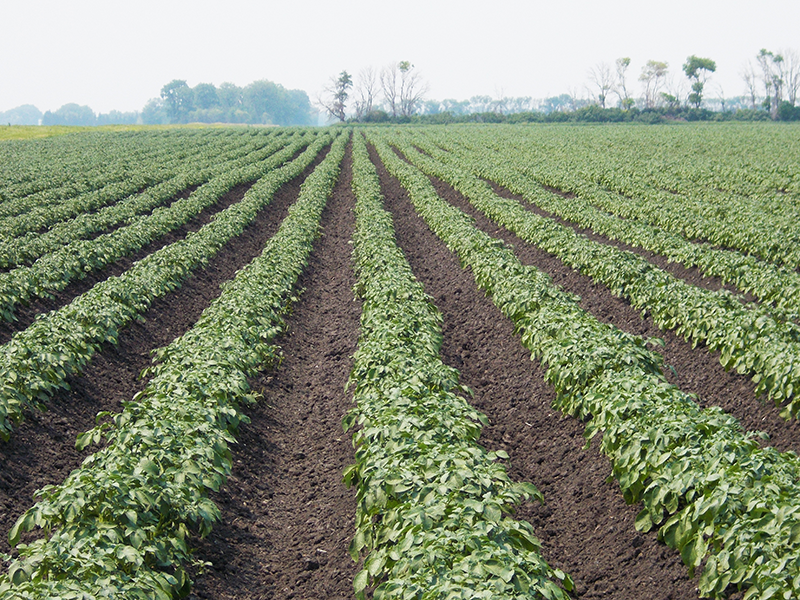Potato growers working to stretch supplies

The biggest challenge for U.S. potato grower-shippers in 2023 might be stretching their volume to last through the season.
USDA estimates harvested acreage for 2022 at 902,200 acres. That’s down from 935,700 in 2021, which itself was a tight year.
“Growers are doing their best to manage expectations and hold onto their pile of spuds to make them last,” said Ross Johnson, vice president of retail for the Eagle, Idaho-based Idaho Potato Commission.
Producers gained some experience dealing with last year’s potato shortfall, he said.
“I think they’re well prepared to be able to keep their partners supplied throughout the season,” Johnson said.
The shortage is making large supermarket promotions difficult, so the commission is trying to coach retailers on how to manage the category during a tight supply situation, he said. “We don’t want to run out of potatoes next June and July.”
Dave Moquist, an owner of O.C. Schulz & Sons Inc., Crystal, N.D., was pleased with the quality of his crop, which he said is 65% red potatoes.
“What we’re putting out the door looks really nice,” he said.
Sizing was good, and prices were decent, too.
“We’re not complaining,” Moquist said, “though farmers could always use more because of the [increased] cost of production.”
Fifty-pound cartons of U.S. No. 1 grade Red River size A round red potatoes were mostly $16 to $16.50, and size B’s were mostly $21 to $21.50 in early December, according to USDA. They were mostly $13 and $20 to $20.50, respectively, a year ago.
Red potato volume was up slightly at Lone Wolf Farms, Minto, N.D., and yields were better than last year, said partner Chris Bjorneby.
“We had perfect growing conditions and nice rain before harvest,” he said. “The quality is the best we’ve ever had.”
Quality also is above the past four- to five-year average at NoKota Packers Inc., Buxton, N.D., this year, said Mike Rerick, vice president of sales.
“A little bit more moisture in harvest would have been better, but otherwise, we’re very happy with the quality we got this year,” he said.
Sizing was good, as usual, and prices have been decent, he said.
“We’re trying to get more for the grower; that’s our goal — to make the growers profitable so they continue to grow,” Rerick said.
He said he expected price increases to continue because of supply issues.

Quality will be good, and supplies will be “manageable” for the 2022 crop from Wada Farms Marketing Group, Idaho Falls, Idaho, said Eric Beck, marketing director.
“We will have supplies, but we’re going to have to be sure to manage them effectively to make things last throughout the storage season,” he said.
Idaho had an overall acreage reduction this year, he said, and yields have been down too.
“Potato demand remains pretty decent,” he said. “In an inflationary environment, potatoes provide a great pound-for-pound benefit.”
As consumers spent more time cooking at home during the pandemic, Wada Farms earned strong sales from its value-added products, like Easy-Baker microwaveable potatoes and small microwaveable potatoes in steamer bags, Beck said.
Hall’s, a Hoople, N.D.-based grower-shipper, finished harvesting in mid-October, which was a bit later than usual, said partner Jackson Hall.
“We were waiting for [the potatoes] to size up and get good skin set,” he said.
The company also waited for rains to start so that the spuds wouldn’t be damaged during harvest.
“It paid off,” Hall said. “We got rain in the northern Red River Valley, and it [dramatically] helped with harvest.”
As a result, quality and yields were good. “Our storage is full” for the first time since 2017, he said.
“With what’s going on in some other parts of the country, it seems the market should be able to handle it,” Hall said.
Like all produce providers, potato grower-shippers are struggling to keep up with rising costs.
“The input costs to grow a crop have definitely gone up,” Beck said.
“We work strategically with our customers to monitor the price points to make sure that we don’t cause a detriment one way or the other when it comes to consumer demand,” he said.
“The growers’ costs keep skyrocketing,” Rerick said. “Things have doubled over the last couple years.”
Costs of land, fertilizer and even packing supplies like poly bags and cardboard are up, he said.
“The valley as a whole is coming off a couple of bad years and now is fighting increased production costs and supply costs,” Rerick said.
“We’ve seen a steady increase in everything, including the equipment that we need to do it all, like tractors, trucks and grading equipment,” Hall said.
“Just because the market is higher now doesn’t mean the bottom line is any higher,” he said. “We’re just trying to maintain.”







